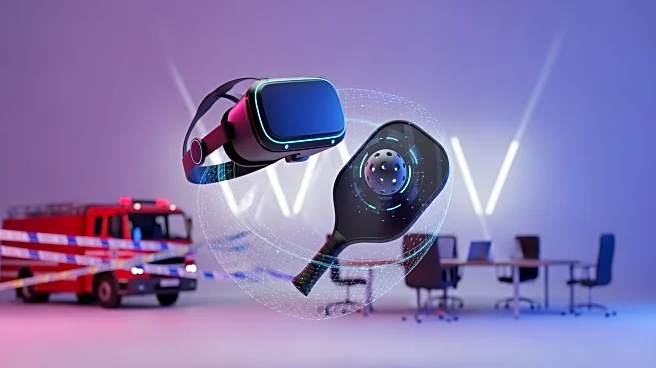What's Happening?
Resolution Games has launched a new virtual reality (VR) game called Pickle Pro, which allows players to engage in colocated pickleball matches using Apple headsets. The game utilizes advanced technologies
such as Antilatency, Optitrack, and Meta Shared Spatial Anchors to create a shared virtual environment where players feel as if they are in the same physical space. This development is part of a broader trend in VR gaming, where automatic co-location technology is becoming more accessible and affordable. The game is available for $7.99 on the Apple App Store, and similar features are being integrated into other games by Resolution Games, including Home Sports on Meta Quest.
Why It's Important?
The introduction of colocated VR experiences like Pickle Pro represents a significant advancement in the VR industry, potentially transforming how people interact in virtual spaces. By enabling players to share a digital environment seamlessly, these technologies could pave the way for more immersive and interactive gaming experiences. This development could benefit the VR gaming industry by attracting more users and encouraging developers to create innovative multiplayer experiences. Additionally, it highlights the ongoing competition between tech giants like Apple and Meta in the VR space, as they continue to enhance their platforms with cutting-edge features.
What's Next?
Resolution Games plans to continue prioritizing colocation features in its future releases, with upcoming titles like Battlemarked also set to include these capabilities. As more developers adopt these technologies, the VR industry may see a surge in multiplayer games that offer colocated experiences. This could lead to increased consumer interest and investment in VR headsets and related technologies. Furthermore, as the technology becomes more refined, it may find applications beyond gaming, such as in virtual meetings, training, and real estate.
Beyond the Headlines
The advancement of colocated VR experiences raises questions about the future of social interactions and the potential for VR to replace or augment real-world activities. As these technologies become more widespread, they could influence cultural norms around socializing and entertainment. Additionally, there may be ethical considerations regarding privacy and data security, as these systems rely on tracking and sharing user movements and interactions.








